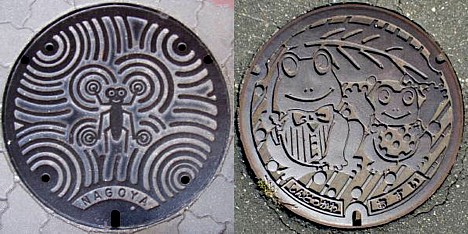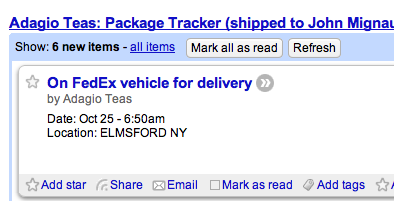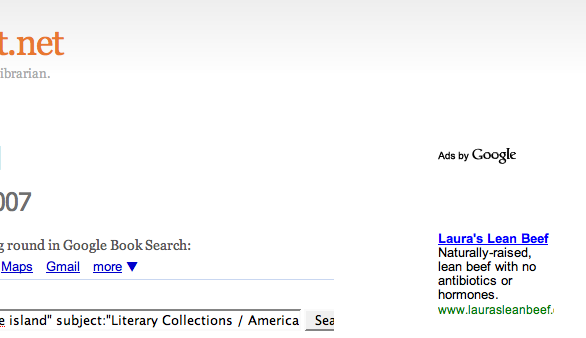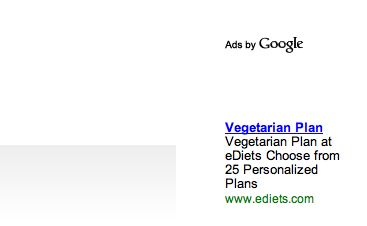Japanese manhole covers
Via Drawn, photos of manhole covers in Japan. Oddly ancient and modern at the same time.

Via Drawn, photos of manhole covers in Japan. Oddly ancient and modern at the same time.

Day 2, and I’m still only seeing POP. (I started checking yesterday.)
Something I’ve been waiting for a long time: package tracking as RSS feeds. Adagio Teas, who I order from frequently, are making FedEx tracking available via RSS:

As part of a IMLS grant we’re working on, I need to find a company that will OCR and double-key about 165k entries from the Index to American Botanical Literature. The entries are spread over a number of volumes. I already know about Digital Divide Data – they were the company we had originally approached about this project, but that was a while ago, and if there’s any other companies people know of, I’d appreciate hearing from you. Thanks!
My iPhone is not unlocked, but I had installed Installer.app and a couple applications, though the only ones I was using with any regularity were iFlickr and Erica Sadun’s SendPics. I installed it last night, after making sure to sync up first. Partway into the “Preparing iPhone” progress bar, the phone went dark and then popped up the yellow triangle/”Please connect to iTunes” screen, which I took as a sign that things were not going well. A few minutes later I got a -1005 (iirc) error message from iTunes. Even with a backup, I still always get that frisson of fear when something like that happens.
Fortunately, at that point I just restored. I lost some photos that I hadn’t imported – somehow I had gotten the dumb idea that photos were imported without pressing the damn import button- but otherwise I’m back to normal, if less my iToner ringtones and Installer.app.
The iTunes WiFi music store is pretty cool. You could easily drop a lot of impulse money on it. Not that I have, of course; I just bought a couple things in the interests of investigating the interface. The store gives Apple a little bit of an edge in this market again; right now, you can’t buy from Amazon MP3 on your iPhone or iPod Touch. If I were Amazon, I’d be figuring out a way to do that.
Technorati Tags: apple, installer.app, iphone
Hmmm, might have to get rid of the Google ads, too:

Updated: Now this is more like it:

Technorati Tags: adsense, google, vegan, vegetarian
Seen this morning whilst goofing round in Google Book Search:

Technorati Tags: digital libraries, digitization, google books, libraries
Via Shelley Powers, there’s a must-install WordPress Update:
WordPress users, upgrade to today’s WordPress security release immediately. This fixes a vulnerability that is ‘in the wild’–examples of how to exploit can be easily found and just as easily exploited.This is not a “We’ll sit around and think about it” update. This is a “Take the steak off the bar-b-que, Joe, and put the margaritas back in the jug! We’ve got work to do!” service release.
Done here – do the same if you’re running WP.
(Cross-posted from the clam.)
Well, I guess it’s finally time to get around to that Food and Wine article that got blipped through all the usual “humane slaughter” outlets. The basic gist of this article is that vegetarians are eating humane meat, including – gasp! – Mollie Katzen! I’ve addressed the Mollie Katzen aspect of this article before; Mollie Katzen’s cooking was never that healthy in the first place, and I never took her all that seriously as a vegetarian to begin with. Tell me that Laurel Robertson has started eating meat and then I’d take notice. But, as to this article, the problem with it is that it’s almost entirely based on anecdotal evidence and straw men. Let’s go through it point by point:
For Andrew and about a dozen people in our circle who have recently converted from vegetarianism, eating sustainable meat purchased from small farmers is a new form of activism—a way of striking a blow against the factory farming of livestock that books like Michael Pollan’s The Omnivore’s Dilemma describe so damningly. Pollan extols the virtues of independent, small-scale food producers who raise pasture-fed livestock in a sustainable and ethical manner. In contrast, he provides a compelling critique of factory farms, which cram thousands of cows, pigs or chickens into rows of cages in warehouses, feed them drugs to plump up their meat and fight off the illnesses caused by these inhumane conditions, and produce innumerable tons of environmentally destructive animal waste.
The terms “grass fed” and “pasture raised”—meaning that an animal was allowed to graze the old-fashioned way instead of being fed an unnatural and difficult-to-digest diet of mostly corn and other grain—have now entered the food-shoppers’ lexicon. But Andrew and I didn’t fully understand what those phrases meant until we got to know Greg Nauta of Rocky Canyon Farms. Nauta is a small-scale rancher and farmer from Atascadero, California, who grows organic vegetables and raises about 35 animals on pastureland. Since we met him at the Hollywood Farmers’ Market a year ago, it has become even clearer to us that supporting guys like him—by seeking out and paying a premium for sustainably raised meat—is the right thing for us to do.
Meat eaters have had it bad for a long time. In the face of growing evidence that it was right up there with cigarette smoking as a pretty unjustifiable habit in almost every aspect, it was increasingly difficult to find anything beyond “But it TASTES good” as a rationale for eating meat. But then St Pollan came along and changed all that. All of a sudden it was possible for a little bit of that PeTA frisson to rub off on meat eaters. All of a sudden you’re not a death-enabling environmental disaster wrapped up in a heart attack waiting to happen anymore, you’re an…ACTIVIST!
And how are you an activist? By supporting boutique meat farmers. And in this lies the first and perhaps most insidious reasoning behind humane meat. Apparently, the only thing that has really kept vegetarians from eating meat is factory farming and the horrible conditions therein. Small meat farmers like Mr Nauta, who raise their animals “humanely,” have effectively removed the moral argument for vegetarianism.
Well, except for that part where he kills them. I have seen slaughter euphemistically referred to elsewhere as one “really bad day.” It’s a ridiculous argument. I know few vegetarians whose objection to meat-eating ignores the slaughter (oh sorry, Queenie, “harvest”) of the animal. Most vegetarians want factory farming AND animal slaughter stopped. It’s not like “humane” practices are a sufficient improvement in animal treatment to nullify the moral objection to meat eating. I don’t want to put dead animals in my body. Period. (And parenthetically, even with boutique meat farmers, I don’t know that basing a food movement on a bunch of foodies in California is scalable to even the rest of the country, let alone the world.)
Next we get the “soy is actually poison” – what I’ve come to think of as the “grass-fed exemption:”
If preserving small-scale farming isn’t a compelling enough reason to eat beef or pork, consider the nutritional advantages grass-fed meat has over the factory-fed kind. “One of the benefits of all-grass-fed beef, or ‘beef with benefits,’ as we say, is that it’s lower in fat than conventionally raised beef,” says Kate Clancy, who studies nutrition and sustainable agriculture and was until recently the senior scientist at the nonprofit Union of Concerned Scientists. “The other thing is that the meat and milk from grass-fed cattle will probably have higher amounts of omega-3 fatty acids, which may help reduce the risk of heart disease and strengthen people’s immune systems. What’s good for the environment, what’s good for cattle, is also good for us.”
Combine these findings with the questions being raised about meat replacements derived from soy and wheat gluten, and the real thing seems better by the minute. “What we know about soy is that as you process it, you lose a lot of the benefits,” says Ashley Koff, a Los Angeles–based registered dietician. “Any soy-based fake meat product is incredibly processed, and you have to use chemicals to get the mock flavor. Any other whole-food diet is going to be a lot better for you.” Vegetarians like Andrew—he once brought a tofu sandwich to a famous Texas barbecue restaurant—may now have a harder time justifying their “healthier” dietary choices.
OK, activism covered. Now, you need to prove that meat-eating is not only as healthy as vegetarianism, it’s actually healthier! Sloppy thinking all over the place here. It’s a question of relativity: no one is saying that feeding cattle grass has now suddenly made beef a healthy food – it’s just LESS unhealthy than the supermarket kind. It’s all still laden with saturated fat and cholesterol. The omega-3 argument then gets trotted out as the clincher – beef is suddenly a good source of omega-3 acids.
Next, we get the “Boca Burger” argument: carnivores may be healthier than vegetarians who eat a lot of highly processed meat analogues. We get the usual handwaving about soy here, though this article is a first in trying to rope in seitan as well. We then get a nutritionist who states the obvious – that heavily processed foods are not that great. Thus vegetarians, who really eat nothing but soy-based versions of meat, would be better off eating actual meat, which are assumed to better for you than soy analogues, because meat has somehow now become a “whole food.” Note also how in that last sentence, tofu gets subtly included in the meat analog category via the cutesy anecdote. This is just silly.
The argument is further bolstered by anecdotes from noted former vegetarians Mollie Katzen, who wee’ve covered before, and – Mariel Hemingway, whose main reason for eating meat again is that makes her feel “more grounded.” Hell, if Mariel’s given it up, I am SO over it. Again, talk to me when Laurel Robertson starts calling meat a “whole food.”
Having knocked down the reasons for vegetarianism one by one, the author moves in for the kill (so to speak):
For Andrew and many of our ex-vegetarian friends, the ethical reasons for eating meat, combined with the health-related ones, have been impossible to deny. “The way I see it, you’ve got three opportunities every day to act on your values and have an immediate effect on something you’re concerned about,” Andrew says. “You’re probably worried about Darfur, too, but what can you do about that every single day? Write a letter? It doesn’t have the same kind of impact.”
Man, Andrew is DEEP. Aside from that, I can only deplore the new activism that equates actvism with consumption. It’s much easier to vote with your wallet than your feet. Well, of course, unless there’s nothing in your wallet.
Ah, but then finally we arrive at the rub:
Supporting ranchers we believe in, and the stores and restaurants that sell their products, has a very tangible impact that we experience firsthand all the time. But ask most vegetarians if the battle between small, sustainable ranchers and industrial farming is at the top of their list of concerns about eating meat, and you’ll probably be met with a blank stare. “For people who are against eating meat because it’s wrong or offensive to eat animals, even the cleanest grass-fed beef won’t be good enough,” Katzen says.
Convincing those people that eating meat can improve the welfare of the entire livestock population is a tough sell. But we’ll keep trying.
Whoops! Damn those committed vegetarians! How’d THEY get in here? Let’s just look at that deal-breaker sentence there again, shall we?
“For people who are against eating meat because it’s wrong or offensive to eat animals, even the cleanest grass-fed beef won’t be good enough,” Katzen says.
You really have to slip this in at the end of the article, because otherwise you look like an utter fool. And really that’s the answer to the question in the article’s title. People who were never really all that vegetarian to begin with are eating meat, because “ethical meat” is the latest flower the foodies have flitted upon. The rest of us, who really are eating a whole food diet – based on plants – who are aware of the nutritional, environmental, and moral advantages of doing so, aren’t fooled by the attempt to put a kindly face on the horror of slaughter. Keep trying. You’ll keep failing.
Technorati Tags: food, foodies, vegan, vegetarian
I hope Brent Simmons got a lot of money for selling NetNewsWire to NewsGator, because he’s thrown the software’s reputation to the wind.
I mostly read news on 2 machines, a Powerbook and a dual G5 at work. Sometimes I also use the iMac we have upstairs in the study. Sometimes I’m on a machine I don’t own with a web browser. What I want is the ability to read a feed item on one machine and have the other machines know that I’ve read it and not show it to me again as new.
If I subscribe to a feed on one machine, I want the others to know that and show me that feed when I read feeds on another machine.
In short, what I need is reliable synchronization across machines.
I don’t think these are particularly unique needs. But NetNewsWire can’t handle this scenario.
In the days when I ran emacs over a terminal connection to panix.com and read Usenet in gnus, this was easy. Whenever I quit, my .newsrc got updated with my read/unread counts, and that was that. It worked.
NetNewsWire once worked pretty well in terms of synchronization. I could synchronize my Bloglines subscriptions with it, and life was good.
Then NNW got sold to NewsGator, and I was magnaminously offered a free 2 year subscription to NewsGator online. Not only that, but they ALSO had an online newsreader, so I could still read either on my Powerbook, my work machine, or a web browser, if I happened to be away from my own machines.
So I switched over to NewsGator syncing.
It has been an utter disaster ever since. NewsGator’s web based reader is an horribly broken shitty piece of crap. I have just spent the last hour making multiple attempts at deleting a folder in my feeds list. I right-click the folder. I select “Delete folder.” The folder disappears. I wait a few minutes to see if the change “took.” I refresh the browser. The folder reappears.
I delete it again. I wait. I quit the browser. I restart the browser and go to the NewsGator reader. The folder is there again. I repeat the process. I quit that browser and open a different one. The folder is still there.
I decide to attack it from the NNW end. I open NNW and tell it to overwrite NewsGator. It merges the list with the online list. There’s the folder still.
During my many replacement attempts, NNW/NewsGator appears to do things in an entirely arbitrary manner, randomly deleting feeds and setting read/unread counts on my feeds.
I do not appear to be alone. A search for “sync” on NewsGator’s NNW support forum yields 178 topics. And from what I can see there, the support staff has no idea what’s going on either. The typical entry has a user complaning about the same sorts of things I am – basically, that the syncing is just plain broken. In one hapless schmuck’s case, after trying every last “fix” in the book, we get this total left-field Hail Mary play from the support guy:
This is just getting weird! Is there any chance that someone else could have your username/password and be using the account at another lcoation? We’ve seen this happen when people sell computers etc and leave the software on it.
Even if you don’t think that is the case, can you try changing your password in NewsGator Online, and also NNW and see if that helps at all.
Of course, in the next reply, the poor user says that that didn’t work either, and then all is silence. This is the worst kind of “support” – the kind where it’s everything and anything’s fault except the software’s. Among the excuses trotted out in the support forum is to check with your IT administrator to see if SOAP headers aren’t getting through your firewall, that people are closing the application before it has a chance to complete the sync, and that perennial favorite – you’re not using a current enough beta.
Google Reader may not be a river of news, take full advantage of Mac OS X services, or be up to Gruber-caliber HIG snuff, but it has one distinct and overriding advantage:
It works as advertised.
Technorati Tags: apple, mac, netnewswire, newsgator, nnw, rss, web2.0
Copyright © 2004–2009. All rights reserved.
RSS Feed. This blog is proudly powered by Wordpress and uses Modern Clix, a theme by Rodrigo Galindez.